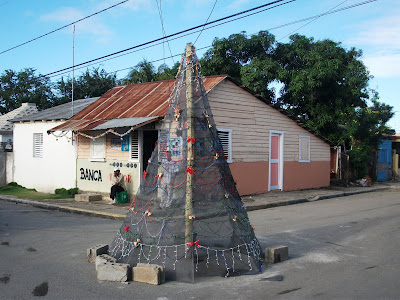
Several years ago, living with my Dominican husband and stepsons, I noticed that when I went outside in the morning to drink my coffee, there were men sitting in various spots around the garden. Doing nothing. Just sitting. I mentioned to my husband that they were like garden gnomes and he told me the Spanish word for a garden gnome was dwendy. It is actually spelled duende and means an imp or a goblin but the name stuck. They were basically people who were unemployed, or self employed with no work. Dwendies are very useful as they do all sorts of jobs for you. Pop to the shops, help in the garden, clean the pool, and the only payment they require is the occasional meal. When we moved to barrio land, I thought that was the last we would see of the dwendies. Not so. We appear to have picked up a little group of them here too. They are the ones who helped us to move house, and once again pop up during the day, just sitting in the garden. I had no idea who they were, what their names were or why they were dwendies, so I thought I would ask. This is what I discovered.

Dwendy chiquito (little)
Little dwendy is actually called Efrin, and he is 18, although looks younger. He lives with his mum and three brothers and sisters. He has never met his father and has no idea who he is. Up until this year he was at school, in the first year of high school. The Dominican school system has years 1-8. with several people leaving after 8th grade, and then four years of high school, when they graduate and can then go on to university. If you fail a year you have to take it again. Efrin wants to finish school, go to university and become a surgeon. He has no wish to leave the country. Unfortunately he was knocked over by a car when he was 10, and his left arm was very badly set, and so it is deformed. Whilst not totally useless, it does not function properly. Apparently an American medical mission saw him in the summer and said they would come back in January and operate on his arm to solve the problem, so that he can become a surgeon. Therefore, he has not attended school this year, as he thought he would fail with taking time off for his arm operation. I really hope the medical mission comes back and helps him, as the cost of arranging it himself would be prohibitive.

Dwendy two
This is Wildelson who is 16. He lives with his father who is a carpenter. His mother is in New York and sends them US$ 150 every two weeks. He is in the first year of high school as well, and he wants to graduate and go to university to study languages, and then work in the tourism industry here. His dream is to go to America eventually. So far so good, but his 19 year old girlfriend is now four months pregnant and so he has 'married' her. Dominican married means basically living together. Although some people do get married legally, it tends to be the minority. So now as well as going to school, he is working with his father to earn money to support his 'wife' and future baby

.Dwendy perezoso (lazy)
This is Frailin who is 20. His mother died when he was 2, and his father didn't want anything to do with him, so he went to live with his grandmother. He went to school up until the 7th grade, aged 14, but had to leave as there wasn't enough money to send him there. Although the public schools are free, the children still have to buy uniforms, writing materials, and pay for transport to get to and from school. I first met Frailin when i discovered he was living in our house, sleeping in my stepson's room. His grandmother had gone to Rio San Juan and decided she couldn't afford to keep him any more, so left him here. He has no house and just sleeps wherever he can find a bed. I put up with him for a couple of weeks, as I felt sorry for him, but all he does all day is chat on line and didn't help around the house at all. I gave him US$15 to go to Rio San Juan, find work and live with his grandmother. He took the money and moved into a house over the road! He says he wants to work but there is none.

Dwendy pelo largo (long hair)
Aged 16, Yeudi is very very charming. He lives with his mother and his stepfather. His father and mother were together for 10 years and now his father cultivates coffee in the hills. He has 3 sisters and a brother, all of whom have different fathers. Yeudi left school in the 7th grade, due to lack of money. He has been 'married' three times, the first time when he was 14. On each occasion his 'wives' kicked him out as he had no money. He has no idea what he wants to do - although I have a feeling he would do well as a sanky panky. He is now leaving to go and join his father and pick coffee so that he can earn some money, and get married again.
Having heard these stories, I was left speechless really. Education, in the broadest sense of the word, is the key to ensuring that children who come from a working and lower middle class background can have some sort of decent future. Not only education of the children themselves, but also of the parents. I just cannot see how a mother can let her son go and 'marry' when he is 14 years old, and how a father can totally abdicate responsibility for his son. These are only four dwendies, but I am sure if I asked the same question of many of the teenagers here, the answers would be similar. There has to be an answer.

 So there I am happily slurping my way through my chicken soup, when suddenly, from beneath the vegetables, a foot rises up from the broth, just like some sort of monster from the deep. A massive knobbly chicken's foot. I half expected it to jump out of the bowl and grab me round the neck. I know that chicken have feet, but I would rather see them where they belong, on the end of the chickens' legs strutting around the streets in the barrio, than lying in wait for me under a pile of vegetables.
So there I am happily slurping my way through my chicken soup, when suddenly, from beneath the vegetables, a foot rises up from the broth, just like some sort of monster from the deep. A massive knobbly chicken's foot. I half expected it to jump out of the bowl and grab me round the neck. I know that chicken have feet, but I would rather see them where they belong, on the end of the chickens' legs strutting around the streets in the barrio, than lying in wait for me under a pile of vegetables.








 favourite part of the rice. He would no more dream of washing it up than flying to the moon, as it takes some effort to get it clean. The easy option is to leave it to soak in the hope that someone else will wash it up, or to hide it in the oven or a cupboard. Out of sight out of mind. At least he no longer throws the dirty pans in the bin as he did when he was much younger.
favourite part of the rice. He would no more dream of washing it up than flying to the moon, as it takes some effort to get it clean. The easy option is to leave it to soak in the hope that someone else will wash it up, or to hide it in the oven or a cupboard. Out of sight out of mind. At least he no longer throws the dirty pans in the bin as he did when he was much younger.

 I suppose for my North American readers I should firstly explain that the dustbin man is the garbage man, well I think that might be what you call it!
I suppose for my North American readers I should firstly explain that the dustbin man is the garbage man, well I think that might be what you call it!



 e here.. In the end two were left behind as we couldn't find them - Zebedee One who was a big neutered ginger tom and Guerrero who is a grey tom with all his equipment intact. As the new house is close to the old one, every day I went back to look for them but no joy.
e here.. In the end two were left behind as we couldn't find them - Zebedee One who was a big neutered ginger tom and Guerrero who is a grey tom with all his equipment intact. As the new house is close to the old one, every day I went back to look for them but no joy.











 agua negra (black water) which goes into a septic tank and plain old dirty water from the sink or shower or washing machine. The later goes through pipes out into the street and on washing day most street around here are flooded with soapy water.
agua negra (black water) which goes into a septic tank and plain old dirty water from the sink or shower or washing machine. The later goes through pipes out into the street and on washing day most street around here are flooded with soapy water.




 The fridge arrived safely, but they did not take anything out of it and so it was full of ketchup and mayonnaise, soya sauce and melted butter. The back fell off the washing machine, and we had to mount it on blocks so that the hose could fit in the drain hole. The top from the wardrobe went missing, as did the screws to put the doors back on. In true Dominican fashion screws were simply taken from something else, so an item which had four screws now only has 2 or 3.
The fridge arrived safely, but they did not take anything out of it and so it was full of ketchup and mayonnaise, soya sauce and melted butter. The back fell off the washing machine, and we had to mount it on blocks so that the hose could fit in the drain hole. The top from the wardrobe went missing, as did the screws to put the doors back on. In true Dominican fashion screws were simply taken from something else, so an item which had four screws now only has 2 or 3.





 A friend will knock on your door, waiting for you to open it
A friend will knock on your door, waiting for you to open it



